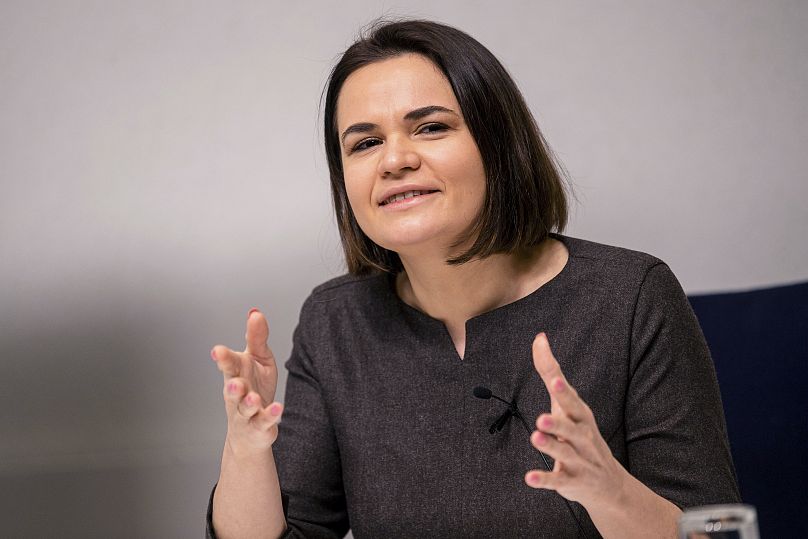On the occasion of International Women's Day, Euronews highlights the stories of Belarus' female political prisoners and the leading role of women in the country's democratic opposition movement.
Belarusian journalists Katsiaryna Andreyeva, 27, and Darya Chultsova, 23, were reporting on an anti-government protest from a central Minsk apartment when police broke into the flat.
 ADVERTISEMENT
ADVERTISEMENT
 ADVERTISEMENT
ADVERTISEMENT
The two reporters were arrested on November 15 last year as they were broadcasting clashes between protesters and security enforcement officers, AP news agency reported.
Andreyeva and Chultsova received a two-year jail sentence last month for "organising actions rudely violating public order," according to the same report.
"The crime was committed with the help of mobile phones, video cameras, a tripod and vests with the inscription Press", according to a state prosecutor statement cited by the opposition group Coordination Council.
The journalists denied any wrongdoing and said they were merely doing their job.
"These prison terms are naked political persecutions," the Committee to Protect Journalists said in a statement.
"They aren't sentenced without reason. They have a prosecution, there is a court hearing," Belarusian Minister of Information Igar Lutsky told reporters.
38 women among Belarus' 269 political prisoners
Andreyeva and Chultsova are not isolated cases. As of March 7, there were an estimated 269 political prisoners in the country, according to Viasna Human Rights Center. According to the opposition Coordination Council for the Transfer of Power, 38 of them were women.
"Among them are human rights activists, musicians, professors, students, journalists. These days, everyone in Belarus can become a political prisoner," the opposition group said.
Julia Mickiewicz, a member of the Coordination Council, was sentenced to a 15-day prison sentence last year for taking part in "illegal" protests and has now been released.
"The trial was not a real trial," she told Euronews. "It was more like a circus".
"The official reason for my detention was that I participated in these marches," she said.
"But during interrogations, I understood that the real reason why I was detained was because of my active position in the feminist group of the Coordination Council."
"They asked me a lot of questions about my activity and my connexions, trying to find names," Mickiewicz continued.
She added that questioning lasted for many hours, without being allowed to receive counsel from her lawyer.
'Soviet era' detention conditions
"The conditions in Belarusian prisons are not very different from the Soviet times," Mickiewicz told Euronews. "The system is based on torture and violence -- physical or psychological," the activist said.
"They threatened my family when I refused to answer their questions," she recalled, adding that she was never allowed to lie down - day or night - and kept seated on a very uncomfortable metallic bench.
While detainees are theoretically entitled to go for a walk for 15 minutes every day, Mickiewicz said she was only allowed to walk twice over her 15 days of detention.
The toilet was merely a hole in the floor in the middle of a small cell shared with seven other women -- most of them also political prisoners, the activist said.
Mickiewicz told Euronews that what sustained her through this ordeal was the "sisterhood" with fellow prisoners.
"We supported each other," she said, sharing everything including clothes.
Mickiewicz added she also organised workshops on gender equality with other inmates.
Women's leading role in Belarus opposition movement
Women have played a central role in the democratic opposition movement of Belarus, with leader Sviatlana Tsikhanouskaya as their emblem.
¨Protests began in August 2020 when Alexander Lukashenko claimed his sixth term as president in an election marred by allegations of widespread fraud.
Tsikhanouskaya, the main opposition challenger in the vote, was forced to leave the country under pressure from authorities.
Lukashenko’s government has harshly repressed post-election protests, the largest of which attracted up to 200,000 people.
More than 30,000 people have been detained since the demonstrations began, with thousands beaten, according to human rights groups.
Mickiewicz told Euronews that women had always played an active role in Belarus. "But it wasn't so visible before because we live in a patriarchal society."
She said protests gave Belarusian women an opportunity to become more visible and "show our strength, our ability to be very active politically and act to like representatives of civil society."
"Unlike what you see in the newspapers, it wasn't just that women started these actions because they stood for brothers or husbands who were brutally detained. Yes of course, but not only. It was also very important for us to stand up for our rights," she told Euronews.
"It was really women who started these chains of solidarity against violence," she noted.
Mickiewicz said there was still stigma from authorities against women who took part in protests "instead of being good mothers and wives."
"Fighting Lukashenko's regime also means fighting patriarchy as a system. "
'Brave women'
The European Parliament awarded the 2020 Sakharov Prize to the democratic opposition of Belarus represented by the Coordination Council, which the EU body described as "an initiative of brave women."
A friend of Chultsova told the Coordination Council: "She understood what a risk it was for a journalist, but she went anyway."
"Even the day before the November 15 stream, I asked her if she was afraid. Darya said that only she and Katsiaryna could go and do this work. And they went."











